Welcome back to our continuing coverage of HBO’s new television series, The Last of Us, starring Pedro Pascal and Bella Ramsey.
With five previous solid episodes, The Last of Us writers finally hit a good stride with this week’s episode with the writing, directing, acting, and storytelling. This is my favorite episode of the season so far!
Let’s get into the recap!
SPOILERS for the show through episode 6 and the game through the content of episode 6.
The Last of Us: Episode 6 “Kin” Summary
Episode 6 opens with a three-month time-skip, indicated visually by a wintery landscape (and a useful little caption). Joel and Ellie break into a house in the middle of nowhere to interrogate the occupants – our mains are lost, and need help getting directions. Under threat of force the people identify where they are on the map. They also warn Joel and Ellie not to cross the river, stating that there’s something dangerous in that direction because everyone who goes that way dies.
Of course Joel and Ellie have to go in the direction of that plot river! As they head out, leaving the occupants unscathed, Joel suddenly stops and leans over on a fence, clutching his chest. It seems like he’s having trouble with his heart. Ellie notices and panics, but Joel regains himself, and they continue on.
Director Jasmila Zbanic gets me with some lovely landscape shots of the desolate, empty, snow-covered Midwest. Here is where the writers really shine – in these interpersonal moments between Joel and Ellie, the dialogue writing is excellent. And finally, finally, they are giving screen time to establish and build the most fundamental relationship that is the crux of their entire narrative. Doing this in episode 6 seems late, but hey, I’m glad it’s here.
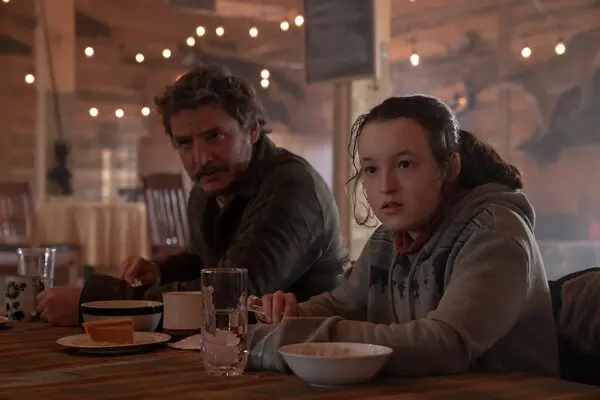
Ellie reveals in these conversations that she tried to cure Sam with her blood. Ellie and Joel speculate about what they could do if the fungus was cured. Joel says he’d like to live on a sheep farm. All the gamers collectively cry into their pillows.
Joel falls asleep by accident and wakes up to find Ellie keeping watch instead. The two argue about how she should’ve woken him up, and Ellie explains through dialogue that she did all the correct steps to keep watch and let Joel sleep. This scene is fine, but it’s a good example of the script telling us something, rather than showing us. In a visual medium like TV, it’s better to show me this happening, rather than to tell me it happened and expect me to trust your narration. It’s a minor point, but a good example for us to use later.
Joel and Ellie successfully cross the dangerous river with no issues. They think they’re in the clear and continue on. However, at another river, Ellie asks if maybe this was the death river. Joel quickly takes out his map and seems to realize again that they are lost and didn’t cross the bad river yet – and just then, they’re surrounded by people on horses!
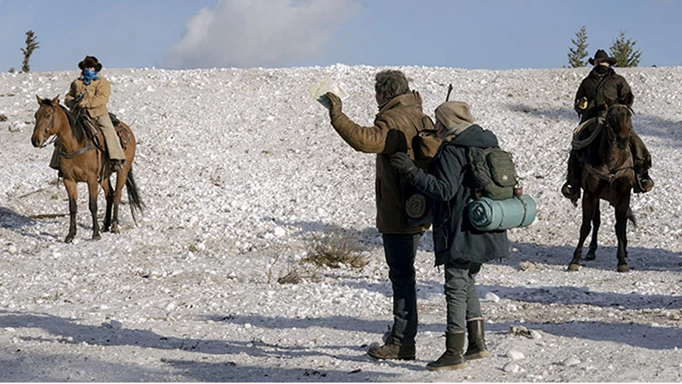
The cowboys send a dog forward to sniff Joel and Ellie to see if they’re infected. As the dog approaches Ellie, we hear Joel’s heart pounding again, and the camera comes in tight on his face as the voices around him are muffled out. Joel doesn’t move. Luckily, the dog does not smell infection in Ellie, and the two are accepted by the cowboys.
As an aside, I’m not sure it makes sense that the dog wouldn’t hit on Ellie as infected. The machine detected infection in her, so why not the dog? It’s an interesting idea, for sure, but seems lackluster if it doesn’t get our mains into more trouble.
Alas, Joel and Ellie are brought to JACKSON!!! Yaaasss!!! And I do a little dance because I’m so excited! Joel reunites with Tommy, who helps show them around. Jackson is a functioning town with about 300 people. Joel and Ellie eat in the dining hall with Tommy and Maria, one of the town’s council members. Tommy reveals he and Maria are married, which seems to upset Joel. Ellie keeps up her tough guard throughout the conversation – and notices another girl watching her from a distance.
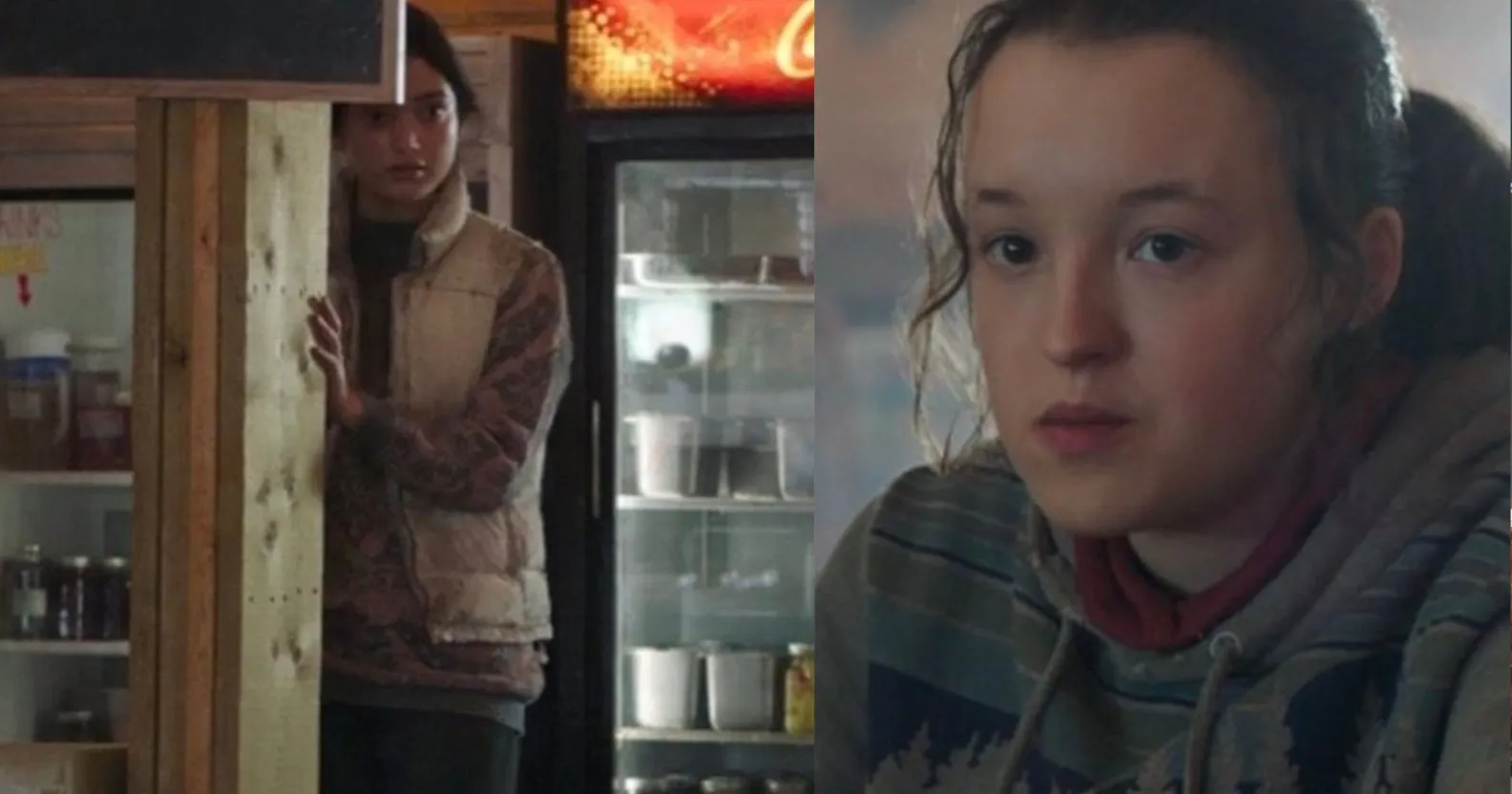
This whole section of the episode is rife with excellent dialogue writing, too much to summarize here. One of the best moments is when Joel accuses Tommy of living like a Communist, and Tommy immediately denies this; Maria corrects him and says yeah, actually, we are communists. This is a commune. Tommy’s face at this exchange is priceless. This is a great example of good writing that gives the actors space to actually act!
Ellie meets the horses and sees a baby horse named Shimmer (DAMN YOU NEIL), before Maria takes her to help her get cleaned up. We learn that Maria was a lawyer – specifically a prosecutor (boo) – and she warns Ellie not to trust everyone. Specifically, she warns Ellie about Joel being a bad person. But Ellie points out that while the script keeps saying he’s bad, Joel hasn’t actually done anything bad on screen, so this attempt at character commentary is completely lost on the audience. Weird way to break the fourth wall there, Craig.
Meanwhile, Joel and Tommy catch up in a bar. Joel is obviously annoyed that Tommy has a whole life now. Tommy reveals that Maria is pregnant. Joel is upset, and Tommy says an *almost* really thematically significant line: “Just because life stopped for you, doesn’t mean it has to stop for me.”
Oof, they were so close to making a great connection there. I’ve been searching for a thematic meaning behind Joel’s watch getting broken the day Sarah died, and him still wearing it for the show and game. The surface-level meaning is just that he’s keeping a memento from his dead daughter. That’s fine and all, but it’s not thematic. However, emotionally, mentally, that is the day life stopped for Joel. And not just life – time. Time stopped for Joel. And a broken watch is a perfect symbol of time stopping, because a broken watch is a physical tracker of time that is literally stopped (and specifically stopped at the time of Sarah’s death). And the fact that the watch is broken in the same moment Sarah is killed gives it extra depth. This is the kind of connection I wish the game had made, and I hope the show actually makes. For this to be thematically significant, however, something has to happen with the watch. We’ll have to wait and see.
After speaking with Tommy, Joel stumbles outside and has another panic attack. This is a beautiful scene that tells a complete emotional story using only the visual, music, and Pedro Pascal’s gorgeous acting. Joel sees a woman who, from behind, looks like Sarah; he then sees her with her own child. The audience gets the idea right away: that should’ve been Sarah! That should have been their life, Joel’s life. These people have everything, but Joel has nothing. And he can’t take the weight of that failure.
Later that night, Joel meets with Tommy again. Joel reveals that Ellie is immune and explains why the Fireflies want her. Joel begs Tommy to take Ellie to the Colorado university. And at this point, Pedro Pascal looks at the camera and says, “You wanna see acting? Hold my beer bro,” and he kills the scene like he pressed triangle and square. Joel cries and tells Tommy he can’t take Ellie because he’ll just fail again. He keeps failing, over and over, and he’ll just get Ellie killed. Tommy is hesitant, but ultimately accepts, and says he’ll leave with Ellie first thing in the morning.
What I love about this scene is that it is the culmination of multiple little moments throughout the first five episodes. Joel does, in fact, fail a lot – I’ve highlighted some of those times in earlier analysis pieces. I noted it as a way to subvert genre expectations, and it definitely is, especially for an adaptation. We expect show Joel to be as competent, strong, and resilient as game Joel; but these are two very different characters. Pedro Pascal steps on magic fungus, alerts clickers by accident, gets lost in cities, gets lost in woods, gets snuck up on, falls asleep by accident – all very realistic, human things that are not characteristics of game Joel. Putting these moments consistently on our screens and having it build to this character moment is excellent character development and script writing.
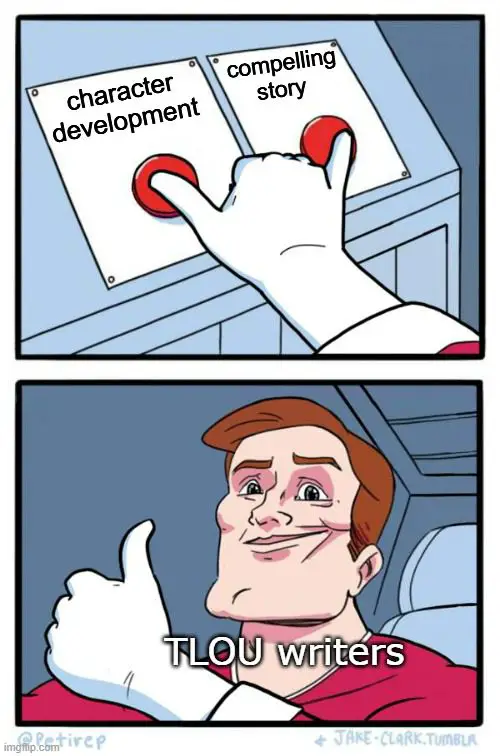
The next scene gave me straight-up deja vu. Joel goes to tell Ellie that he’s passing her off to Tommy, and this time Bella Ramsey says “Hold my beer” and steals the scene. This sequence is almost verbatim from the video game – an excellent choice, since it is such an iconic scene. Ellie tells Joel that while she isn’t Joel’s daughter, she understands about loss because she’s lost everyone in her life. Joel says they’re going their separate ways, and storms out. It’s a powerful scene that lands in all the right emotional ways.
Unfortunately, it’s followed by some silly little film-student-esque montages that gloss over necessary emotional beats and instead create a wee little plot hole in this episode. We’re shown memories Joel is having of his daughter, Sarah, hanging Christmas ornaments with him. The sad music is sad. We do get a shot of Joel’s unbroken watch, which is nice, I guess. But this little montage goes on for about half a minute, and then within a literal minute of screen time we’re into the next scene where Joel changes his mind (literally 44:20 to 45:15).
So in the next scene, Joel changes his mind! He tells Ellie she should have a “choice” and, of course, she chooses him. Tommy says goodbye to them, and they ride off into the sunset.
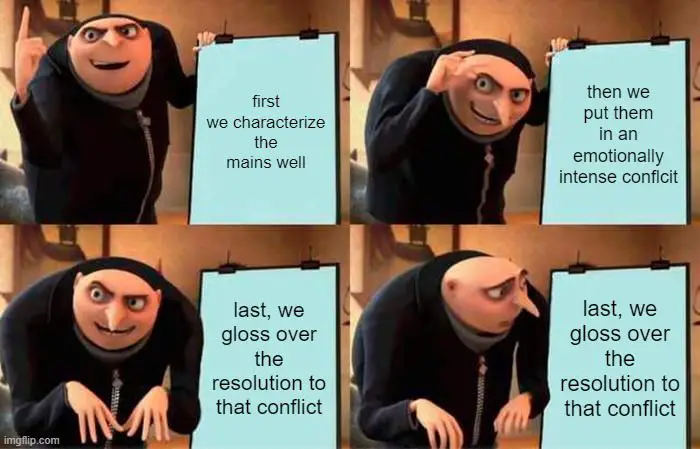
So here’s the thing – I don’t understand why Joel changed his mind. Now I could sit here and try to fill in the gaps for the narrative, but on the screen it is unclear. He just told Ellie she’s not his daughter; so then thinking about Sarah makes him change his mind? Also his line about “choice” isn’t relevant because the story has no themes about choices, or not being given a choice, etcetera you get the picture. It felt at this moment very rushed because the writers wanted to get to the next set-piece, which is Colorado.
All gamers will know exactly why this moment was off – this was a cut from the source material. In the game, when Ellie discovers that Joel is leaving her, Ellie runs off into a dangerous area nearby Jackson. Joel and Tommy have to go save Ellie and bring her back. During this treacherous field trip Joel realizes he cares for Ellie and feels a responsibility towards her, so he accepts that he must be the one to take her to Colorado. The writers of the show didn’t want to include that (god knows why, they could’ve), and excising that plot point proved to be a poor decision.
Additionally, why couldn’t Tommy go with them? Show Joel was worried he wouldn’t be able to protect Ellie. Tommy got permission to go, or at least he was gonna go even without permission. Why couldn’t all three go? Again, in the game Joel takes the responsibility; here, there’s a genuine concern for safety. This detail widens that plot hole a little more.
Joel and Ellie head out to the Colorado hospital, and as it turns out, the very dangerous, bad road to the location is in fact perfectly fine. They get there in only five days. They find the Colorado university abandoned – Joel even finds an artifact, I mean, a list of things to pack that the Fireflies took when they left. On an upper floor Joel and Ellie find a map of the United States with clearly marked paths leading to another location in Salt Lake City. The two conclude the Fireflies must have gone there.
Now this is an excellent example of two things: show don’t tell, and truncating story from the game. First, the writers and director here use the visual to show us where the Fireflies went – it’s clear from the map with the pins all converging on Salt Lake City that everyone went there. The characters’ dialogue naturally flows from that discovery, and confirms it for the viewer. Second, in the video game, discovering where the Fireflies went is a whole process. You as the gamer have to explore the hospital, find clues, read notes, listen to recordings, and so on to figure it out. They cut down what is easily thirty minutes to an hour of gameplay into about fifteen seconds, and if you count all the scenes in the hospital to this point, just a matter of minutes. Well done, writers. Well done!
As Joel and Ellie are leaving the university, they are attacked by raiders (would’ve been great to see these people on the road to Colorado, but alas…). Joel gets stabbity stabbed, proving yet again that he was right to be afraid of failure in this circumstance.
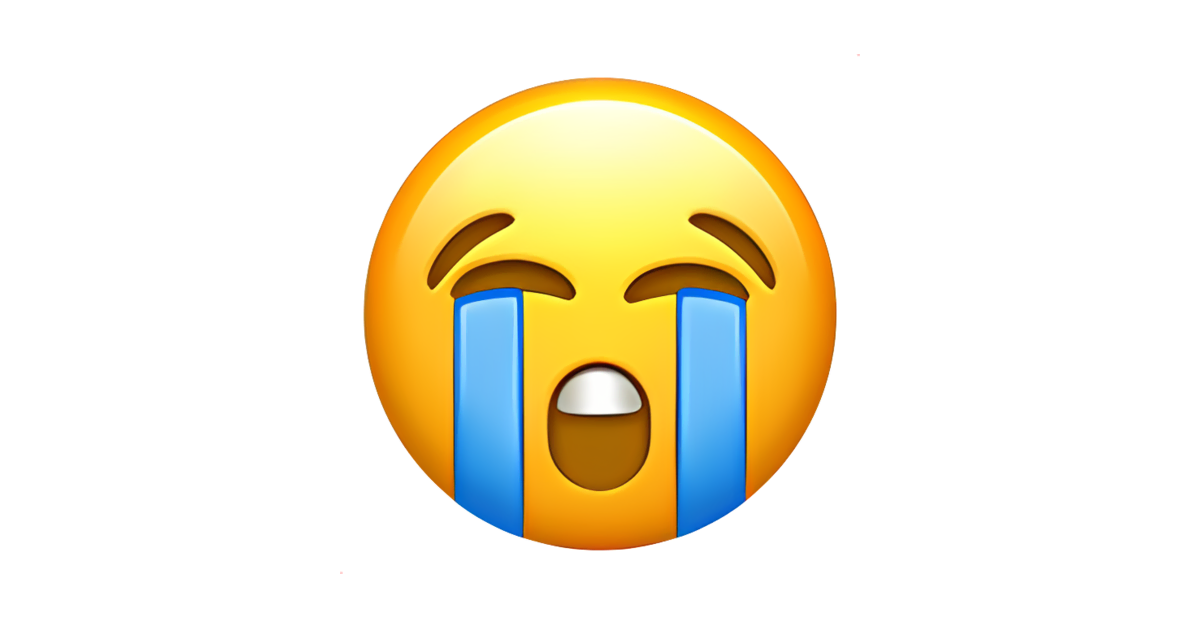
Ellie gets Joel out of there, and he then collapses in the snow. Ellie cries to him that she can’t survive without him. The screen cuts to black with Pedro Pascal looking really, really rough.
What a good episode!!!
Analysis: Pacing is Ineffable
One of my favorite literary analysis internet writers and commentators, Fandomentals’ own Julia, once said that pacing is ineffable – you can tell when it’s good or when it’s bad, but it’s hard to explain why. That sentiment is on full display here with The Last of Us, and is something that concerns me going into the end of the season.
Pacing of a narrative means the speed at which the plot is moving. Main plots need to move in a story, but if it moves too fast it’ll feel rushed, too slow and it’ll get boring. A more-or-less linear story like The Last of Us moves the plot along by having the characters meet new challenges, overcome them, and move on to the next plot point. It slows down for character moments, like the interpersonal conversations between Joel and Ellie. You can see how both are necessary to tell this story. There must be a balance between them to give the narrative substance, structure, and authenticity.
I found this episode well-paced. We had a fair balance of plot points and interpersonal moments. And overall, this episode advanced the plot of the season: getting Ellie to the Fireflies. It also introduced our next challenge: will Joel survive?
Episodic television must always consider pacing on both levels – by episode and by season. If it’s a multi-season show, there’s a third layer of considering pacing by series length. This is why shows often hit a slump a few seasons in – like Supernatural or Star Trek – because pacing a multi-year narrative is a difficult task. More recently in television we’ve seen these one-season limited-series shows that have done great. This is partly because it’s much easier to hit excellent pacing with a shorter story.
From the beginning of The Last of Us show, the community as a whole has been concerned about fitting the entire first game into one season. I personally am still worried. We have three episodes left, and the next one seems to be a flashback of the DLC Left Behind. I can speculate as to what the last two episodes will be substantively, but I still do not think we’ve gotten enough bonding between Joel and Ellie to justify the ending. This episode was a great step in that direction. But this is episode six. We needed more of this earlier on, with more space to breathe. If this had been earlier – even episode four or five – it would’ve been a mid-season hurdle that could have worked. Now, we’re left in an odd place pacing-wise.
Overall, I really liked this episode. It was my favorite episode of the season, and for that I will give it an 8 on my totally arbitrary and subjective rating scale. However, I remain suspicious of these pacing choices. We should revisit pacing at the end of the season.
Also, now that we are six full episodes in, I feel comfortable saying: The Last of Us is a good show!
Images from The Last of Us courtesy of HBO
Have strong thoughts about this piece you need to share? Or maybe there’s something else on your mind you’re wanting to talk about with fellow Fandomentals? Head on over to our Community server to join in the conversation!

